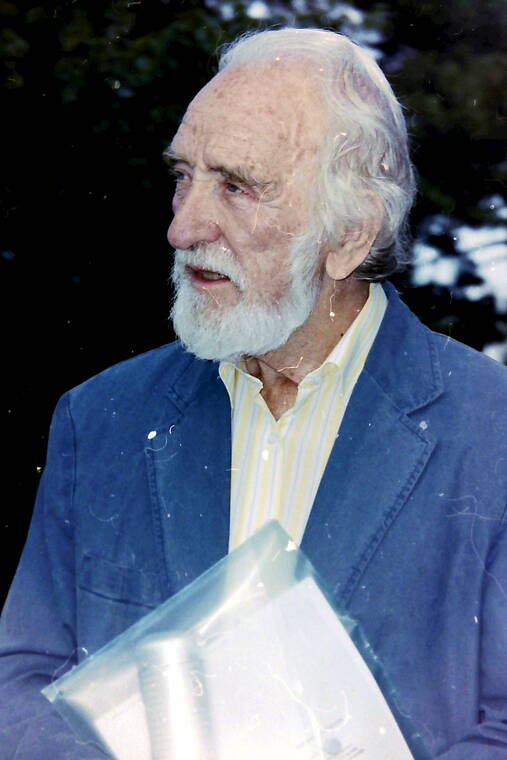C. Wycliffe Noble - An Architect Who Championed Accessible Building Design.
Locally Wycliffe has been a dedicated and active founding member of SCAN using his specialist knowledge to the benefit of people with disabilities in Spelthorne Borough. He provided accessibility regulation advice on planning applications submitted to Spelthorne Borough Council until 2010. He supported the development of the Staines Shopmobility service that provides access to shopping and other activities in Staines town centre.
In his capacity as Access Architect, Wycliffe Noble worked with the management and staff of the Riverside Arts Centre, the Sunbury Walled Garden, the Embroidery Café and Sunbury Parish Church. He has also been able to advise the management at The Goat Restaurant at Shepperton on modifications needed to make their premises compliant with accessibility regulations.
He worked with people with visual impairments;
- to improve access at pedestrian crossings with tactile paving and
- to design laminated tactile guides that are linked to clay markers set out on posts around Sunbury’s Walled Garden
Buildings he has made accessible for disabled people include Park House, Sandringham, Somerset House, the Royal Albert Hall and the Houses of Parliament, Westminster. He was awarded the OBE for his services to accessibility in 1976.
He Co authored the book - Access for Disabled People to Arts Premises with Geoffrey Lord that set out to highlight and promote accessibility under requirements of the Universal Declaration of Human Rights – Article 27. “Everyone has the right to take part in the artistic and cultural life of the community”
A founding member of SCAN, C. Wycliffe Noble OBE, was the driving force behind BS 8300 standard, which lays down sweeping requirements for building design to accommodate the needs of people with a wide range of disabilities. As Chair of the British Standards Institute's Technical Committee, Wycliffe spent six years painstakingly researching the contents of the new standard which came into effect in 2001.
"This really is a major breakthrough", says Mr. Noble. "For too long we have seen examples of building design that ignore the needs of people with physical, sensory or cognitive disabilities. This causes them unnecessary difficulty and inconvenience and very often exclusion from facilities, experiences and enjoyment that those of us who are more fortunate take for granted."
C. Wycliffe Noble OBE FRIBA FRSA was chairman of SCAN for several years and was a consultant architect to organisations and major charities in the field of building design for disabled people. He acted as advisor to the Palace of Westminster, the Albert Hall, Somerset House Trust, the Leonard Cheshire Foundation and Park House, Sandringham.
Wycliffe remained a very active member of SCAN well into his 80’s. In his capacity as Access Architect, Wycliffe also worked with the management and staff of the Riverside Arts Centre, the Embroidery Café and Sunbury Parish Church.
In 2010 he received a RADAR (Now Disability Rights UK) Person of the Year Award from Dame Tanni Grey-Thomson. The Citation read: “For nearly 40 years Wycliffe has promoted access for disabled people. In the early 1960’s he was one of the first architects to take on disability access issues, and has had an immeasurable influence on the accessibility of modern Britain. He has chaired the British Standards Institution committees relating to access for disabled people and has been a leading player in the International Technical Aids and Access Commission established by Rehabilitation International. This nomination recognises the immense work and dedication given to the cause of equal access of this unsung hero throughout the last five decades.”
In 2012 he was presented with a Spelthorne Civic Award by the Worshipful Mayor of Spelthorne, Councillor Sam Budd.
